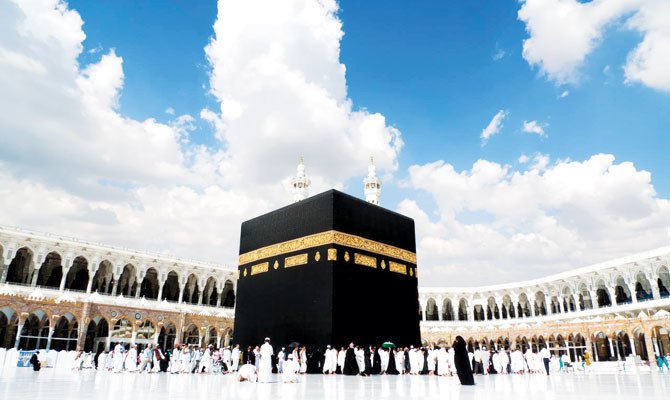
First encounters with the Kaaba
“Awe at first sight” was the fitting title of a special event at Makkah Cultural Club in celebration of the Kaaba and its importance to Muslims and non-Muslims alike.
Dr. Abdullah Al-Tariqi, a Saudi academic specialized in historical studies, highlighted some of most important cultural trips to Makkah by intellectuals and other travelers, and the overwhelming feelings they described upon seeing the Kaaba for the first time.
Western travelers
1: Renowned French photographer Jules Gervais-Courtellemont was born near Paris in 1863 and moved with his stepfather to Algeria in 1874, where his passion for photography prompted him to open a small shop. He visited Makkah after converting to Islam and took exquisite photographs that he displayed in Paris.
First impressions of the Kaaba: “During this incredible journey in this mysterious city whose very name breathes mystery and enchantment, I find myself living a miracle. I conjure up events of the night, I see mists, hallucinations and bewilderment of the unknown as I come closer to the wall of the Kaaba. Sleep has abandoned me for three nights now, and with the temperature dropping, I find pleasure in going to the Kaaba, enjoying the sound of muezzins calling for prayer. There are no human tones more harmonious, more warm, more strong and fresher then the call for prayer, what a mesmerizing scene.”
2: Joseph Pitts, an Englishman born in 1663, was obsessed with the sea and travel. Captured by pirates in Algeria, he was sold as a slave. He accompanied his master on a pilgrimage to Makkah and later, when he wrote about his experiences, he became the first Englishman to give an account of the proceedings of Hajj.
First impressions of the Kaaba: “At the very first sight of the Kaaba, the pilgrims melt into tears; and I profess, I could not choose but to admire their devotion and affection, and the awe and trembling they were possessed in. In so much, that I could scarce forbear shedding of tears to see their zeal.”
3: German explorer Domingo Francisco Jorge Badía y Leblich, better known by his pseudonym Ali Bey el Abbassi, visited Makkah in the early 19th century to perform Hajj.
First impressions of the Kaaba: “It was an overwhelming experience. When I kissed the black stone, a sense of tranquility invaded me.”

4: British explorer Sir Richard Francis Burton disguised himself as a Muslim pilgrim to visit the holy cities of Medina and Makkah in 1853, at a time when Europeans were banned under penalty of death. The following year he sneaked into the equally forbidden East African city of Harar in Eritrea.
First impressions of the Kaaba: “The scene is one of the wildest excitement. Men prostrate themselves on the pavement, shedding floods of tears and pouring forth frenzied ejaculations. As for me, I felt a sense of satisfaction, a mystic lure.”
Contemporary writers
1: Egyptian author and intellectual Taha Hussein, born in 1889, was known as “The Dean of Arabic Literature” and is considered one of the most important writers from the Arab world. Although he wrote many novels and essays, in the West he is best known for his autobiography.
When Hussein arrived at the Hadiba Mosque on his way to perform Umrah, he stopped and took a bunch of dirt in his hand, smelled it and said, while shedding tears: “I smell the scent of the Prophet in this sacred soil.” This feeling accompanied him throughout the Umrah, and when he reached the Kaaba, he stood there crying.
First impressions of the Kaaba: “The French say that every educated person has two countries: His homeland and France, where he got his education. But I say today that every Muslim has two countries: His homeland and this sacred country which established his nation and shaped his heart, mind and taste.
2: Dr. Mohamed Hussein Haykal, born in 1888, was an Egyptian writer, journalist, intellectual and politician. He obtained a Ph.D. in Law from the Sorbonne University in Paris in 1912.
First impressions of the Kaaba: “I was so amazed by the scene of the Kaaba, standing tall in the middle of the Mosque, that I couldn’t take my eyes off it. A feeling of serenity rocked my body as I moved toward it with reverence and awe.”
Travelers from Andalusia and the Muslim West
1: Ibn Battuta, born in Tangier, Morocco, in 1304, was a traveler, historian and magistrate of Berber descent. Named the prince of Muslim travelers, he visited much of the Islamic world and many non-Muslim lands.
First impressions of the Kaaba: “Like a bride who is displayed upon the bridal-chair of majesty, and walks with proud steps in the mantles of beauty.”
2: Ibn Jubayr, an Arab geographer, traveler and poet from Al-Andalus (which at its peak occupied most what is now Spain and Portugal), was born in Valencia in 1145. He is renowned for his abilities in mathematics, science, linguistics and literature, as well as his travels.
First impressions of the Kaaba: “As we marched that night, the full moon had thrown its rays upon the earth, the night had lifted its veil, voices struck the ears with cries of, ‘Here I am O God, here I am,’ from all sides.”

























